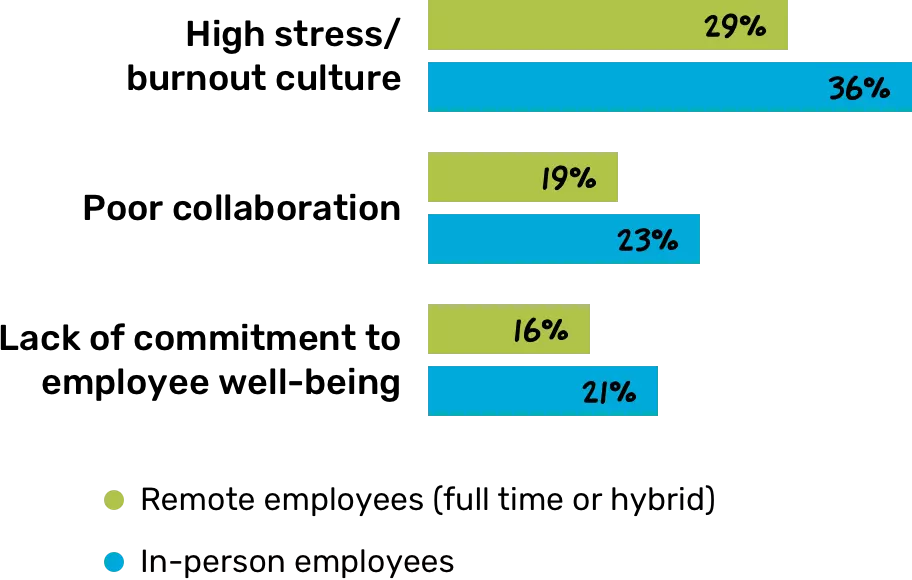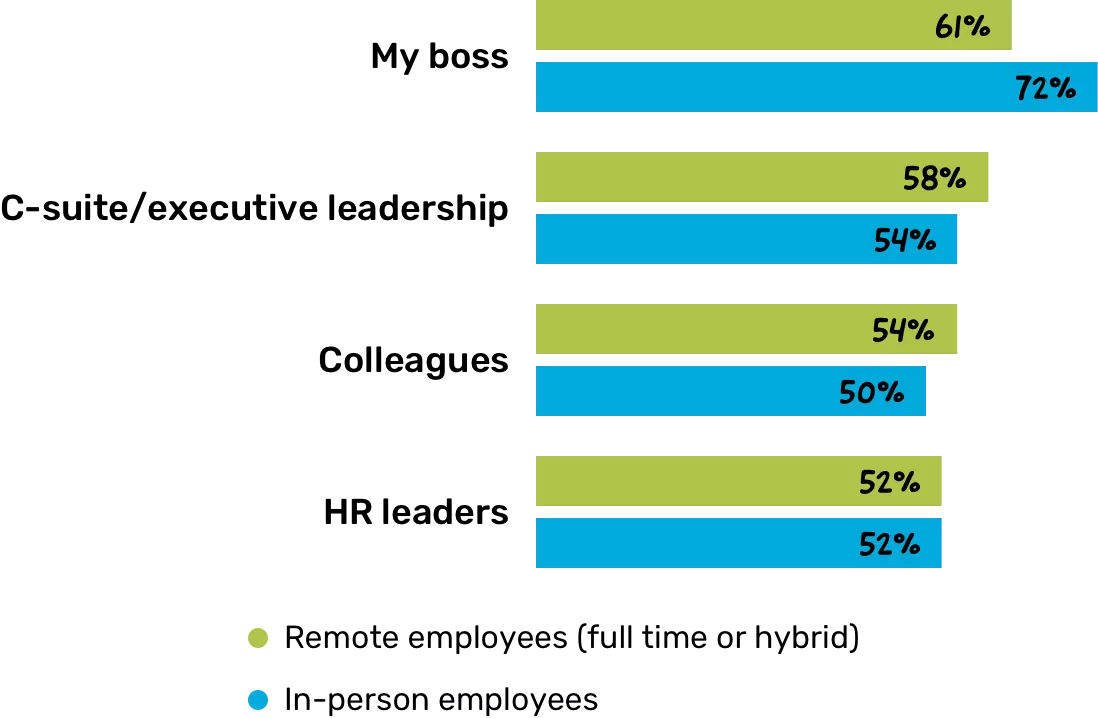Report
The state of organizational culture 2024: Hybrid work’s unexpected impact

Organizations continue to wrestle with remote work. Should they allow their employees to work from home? And if so, how much of the work week should be spent at home versus in the office?
Amid this current debate, Eagle Hill Consulting research finds that organizations may have inflated the fear that fully remote or hybrid work environments erode organizational culture. Our research shows remote and hybrid employees hold a more positive outlook on the culture of their organization than their in-person counterparts. We also found that when compared to in-person employees, culture has a greater impact on their productivity, motivation, and commitment to achieving organizational goals.
The positive impact hybrid work is having on organizational culture
Consider this: 45% of employees who work remotely, either full-time or in a hybrid situation, feel their organizational culture is better than most other organizations, compared to 36% of employees who work exclusively in person. More than a third (36%) of remote employees* feel their organizations have placed more focus on employee well-being over the last year. Compare this to just 26% of in-person employees.
In addition, remote employees are more likely than in-person colleagues to see their managers and leadership in a positive light. They are also more likely (74%) than in-person employees (67%) to say their C-suite leadership positively impacts organizational culture. Similarly, 83% of employees who have the opportunity to work remotely say their boss is positively impacting organizational culture, compared to 77% of those who only work in person.
Remote employees’ engagement depends on strong organizational cultures
Moreover, we find remote employees are highly attuned to the impact organizational culture has on their productivity. Our research shows that remote employees are more likely than in-person employees to tie culture to positive work engagement, across a whole range of dimensions. These dimensions include not only “hard” measures, such as productivity and efficiency, but also crucial “invisible” attributes, such as commitment to ethical behaviors; willingness to do their best work; commitment to helping achieve company goals; innovation and creativity; and ability to best serve customers.
Culture has greater impact on positive work engagement in remote settings
Q: The culture at my workplace impacts my:

Source: Eagle Hill Consulting Organizational Culture Survey
Our data also shows that people who work remotely, either full time or in a hybrid situation, seem the most tied into their organizations through culture. For example, 43% of remote workers, compared to 36% of in-person workers, said that organizational culture is an important factor in their decision to stay at their organization.
Crucially, employees working remotely are also less likely to observe high stress or burnout culture, poor collaboration, and a lack of commitment to employee well-being than their in-person colleagues.
Taken together, these findings indicate that far from being immune to organizational culture, remote employees feel their organizational culture’s impact on their attitudes and performance even more strongly than in-person employees. Smart leaders can and should translate remote employees’ affinity to organizational culture to a business advantage.
Remote employees are less likely to perceive toxicity
Q: Have you observed any of the following behaviors related to culture in your workplace within the last year?

Source: Eagle Hill Consulting Organizational Culture Survey
The opportunity to reshape culture through the return to office
When considering their return-to-office policies, employers must recognize the impact remote work has had on employees’ perceptions of organizational culture—and their organization as a whole. Whether employees will stay remote or return to the office, culture exercises a demonstrably powerful influence on their work and should be used to further motivate people, promote organizational values, drive engagement, and improve recruiting and retention.
By building on the cultural elements that employees have come to prize highly while working remotely (for example, flexibility, work-life balance, and customized, comfortable workspaces), organizations will gain a powerful lever for improving engagement, productivity, and the business bottom line.
Our research indicates organizations with fully remote or hybrid workforces already have a strong starting point for healthy cultures. Of employees who work fully remote or hybrid, 63% say they would recommend their organization on the basis of culture. In contrast, 55% of employees who work in person would say the same. Moreover, remote employees are more likely to believe employees at every level bear similar responsibility for organizational culture. For this group, when it comes to improving organizational culture, it’s “all for one, one for all.” That’s why remote employees place equal accountability across the organization, while in-person employees overwhelming place the onus on their boss.
Who is responsible for culture?
Q: The following individuals are responsible for organizational culture:

Source: Eagle Hill Consulting Organizational Culture Survey
On the other hand, organizations that are bringing employees back to a full-time in-person situation may experience resistance and a resultant spike in negative attitudes and behaviors, and so especially need to focus on strengthening their organizational culture. Our research on workplace flexibility shows that nearly half (47%) of U.S. workers will consider looking for a new job should their employer reduce remote and hybrid work flexibility. And 42% of employees feel that their employer reducing flexibility would decrease their job satisfaction.
This time of transition presents organizations with an opportunity to be intentional in translating highly prized cultural attributes from remote work into their in-person environment. Otherwise, cultures will evolve on their own, potentially toward places organizations don’t want them to go.
We offer these recommendations to reshape and improve organizational culture as you continue navigating the hybrid workplace.
1
Reinvigorate core values and behaviors
Over the last several years, organizational cultures had to adapt to fit the remote workplace. For better or worse cultural norms, practices, and employee behaviors may have diverged from core values. This period of transition offers organizations an opportunity to revisit core values to ensure they still support your goals and resonate with your workforce. At the same time, critical values-based behaviors should be re-examined and modified to continue to bring core values and culture to life.
2
Ask employees what they need—and listen
Our research finds that nearly 70% of employees have not been asked for their input when it comes to their workplace flexibility preferences. Employees know what they need to make in-person or remote work successful. Solicitating their feedback not only builds trust but can inform strategies by identifying what’s going well and what’s not. After all, having direct input into workplace policies and initiatives can increase the likelihood of their success.
3
Leverage teams as culture champions
Team leads and teammates play a critical role in creating positive employee experiences and upholding organizational values and culture. Developing shared team norms, goals, and metrics can help create high-performance teams and a sense of camaraderie and connection, no matter where team members work. Doing so not only supports values-based behaviors, but also pushes accountability for organizational culture down through the organization.
4
Reinvent how your organization manages performance
No matter the size or location of your workforce—fully remote, in-person, or hybrid—champion a performance culture that embraces the idea that what matters most isn’t where employees do the work, it’s how they do it. Put structures in place to act on this mindset, including assessing if feedback mechanisms and employee recognition and reward programs are still relevant to employees and managers in your current work environment.

Culture can make or break your strategy. Do you know where your culture stands?
Methodology
These findings are from the Eagle Hill Consulting Organizational Culture Survey conducted by Ipsos from July 25-28, 2023. The survey included 1,315 respondents from a random sample of employees across the U.S. *When speaking about remote employees, this includes respondents who indicated they work fully remote or in a hybrid situation.

